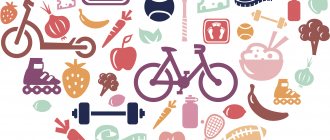It seems like a completely simple word – “choice”. But how much is contained in it! Make a choice - what could be easier? You just need to choose - decide on some option. But why is making this most notorious choice so difficult? And - here's the paradox - the more options a person has, the more difficult it is to choose one thing.
For what reason, when faced with the need to choose, can a person refuse to choose anything at all or give this prerogative to someone else? What makes a person constantly put off making a decision?
And this applies not only to those cases when we are talking about something global, but also to seemingly completely trivial situations...
Psychology of choice
One of the famous American specialists in the field of existential psychology, Salvador Maddi, noted that whenever a person faces the need to choose, he must remember that in reality he has only two options - either to make a choice in favor of his past, or - in benefit of the future.
What is a choice in favor of the past?
A choice in favor of the past can be considered the choice that a person makes in the direction of what is familiar and familiar to him. When making such a choice, a person is guided by the principles of stability, being in a comfort zone, confidence in the future, because, in fact, there is no need to make any special efforts or change anything. In addition, there is a fear of the unknown, because... a person does not know what an unusual choice may entail in the future.
What is a choice in favor of the future?
By making a choice in favor of the future, a person automatically dooms himself to anxiety, because unpredictability and the unknown appear before him in all its glory, because It is impossible to predict the future, in other words: the future is a “dark horse” for a person. This is where worries and fears come from. But it is important to understand that personal growth and personal development are only possible in the future.
From all this the conclusion follows: whenever we have to choose something, we must choose either in favor of our innermost peace or in favor of the anxiety that torments us. And the first of these paths will lead us back, and the second will lead us forward.
But how to make a choice? How to understand whether it will be correct or not?
Self-development
A person who is successful in all respects is distinguished from a mediocre person by only one thing - the desire to improve himself. This can be a constant craving for new knowledge, reading specialized literature, completing trainings and even spiritual development. If you want to live and not exist, constantly develop, learn something new, try, experiment, conquer new heights. Your choice to develop yourself, or lack thereof, will impact every aspect of your life.
The choice of how to live is yours!
Elena,
What makes it difficult for a person to choose?
Understanding the correctness of the choice is the whole “salt” of the question of choice. To put it a little differently, the indicator of the correctness of a choice is determined by its result, and this result can only be in the future, which has not yet arrived, because we live in the present.
Having come to understand this, people quite often make all sorts of attempts to somehow influence the outcome of their choice, waiting for the most suitable moment for it. But this is the reason, firstly, for procrastination, and secondly, for not making a choice at all. Agree, it’s impossible to make a decision tomorrow - all our excuses are like: “Later”, “A little later”, “Tomorrow”, etc. – this is just an illusion, and these moments themselves in most cases never come. Any decisions, any elections must be made right now. And this “now” is the starting point of the process of realizing our choice.
There is something else that makes it difficult for a person to choose - this is the price that he is willing to pay for it. This price represents the sacrifice he makes in order to realize his choice. If a person is not ready, or even worse, does not want to “pay”, this is pure readiness to become a victim. Why?
The victim, like anyone else, of course, has the ability to make decisions. But as soon as the need to pay the price arises, all sorts of complaints begin to come from him about how “terribly, badly, painfully, pitifully” he is, or he generally begins to look for “extreme” ones - those on whom to shift the responsibility. For this reason, when making a decision, you should always think about its consequences - about what you will have to give up. This is where you need to learn to ask yourself the right question: “Is it worth it?” Only by realizing the very value of the choice made does a person become able to change his life or leave everything as it was before.
But what is also important is the ability to take responsibility and understand that you are responsible for what happens to you and in your life - you are responsible for the consequences of this or that choice.
Don't rush into big decisions
The biggest problems in relationships begin when partners bind each other: through marriage, joint property, children, etc. I am not saying that there is no need to bind. But weighing everything carefully so as not to get into endless ordeals is at least reasonable.
For example, one of the most common problematic situations in relationships is the dependence of a woman with a child on a man who is already disgusted with the relationship. I won’t even describe the essence of the problem - it is obvious. But not everyone realizes how risky the decision itself is to have children without deep, time-tested, mutual trust.
And here is the recommendation:
Don’t rush anywhere in a relationship, don’t buy into beautiful impulses and promises, and even more so, don’t childishly count on chance (they say, with the birth of a child, everything will work out on its own), but first, get to know each other well and rely on them, no matter how dry it may sound , on statistics - real reliability, verified by actions.
It’s not for nothing that they say: “measure seven times, cut once.” Otherwise, there is a high probability of drowning in another drama, now headlong. The most serious “mistakes” are made unconsciously, on the basis of temporary impulsive emotions, for which already in the usual stable state one has to bear responsibility.
Another rule calling for curbing idealistic romance:
Consequences of choice
The most pressing consequence of any choice is that choosing one thing means giving up something second, third, etc. If we open one “door”, we have to close the second. That is why the more alternatives a person has, the more difficult it is for him. In such situations, people utter the sacramental phrase that they are “torn to pieces.” Here the following intrapersonal conflict arises: “I need and want,” “I don’t need and don’t want,” “I need and don’t want,” “I don’t need and want.” And this conflict must certainly be resolved. A person can resolve it by resorting to several cunning methods.
How to make a choice?
In total, there are three ways to make a choice without harming yourself.
Method one: Try to make several elections at the same time. But here it is appropriate to recall the well-known proverb: “You can’t sit on two chairs.” But it is unlikely that you will be able to sit on two chairs. As a result, it turns out that the person never makes a choice, which means that he remains in the same place.
Method two: Leave yourself escape routes. The person seems to make a decision and do something, but every now and then he mentally returns to the starting point, thinking that perhaps it is worth choosing another option. The result of such a “choice” will be that all decisions and actions will be a movement “with a pitchfork through the water” or, as they say now: “About nothing,” because in order for the choice to have some effect and bring results, it is necessary to choose one option finally and irrevocably, completely forgetting about other/other options.
Method three: Go with the flow. Everything is simple here: a person takes absolutely no action, and hopes that the choice will be made by itself, without his direct participation. Another option is also possible: a person can wait until someone chooses for him in order to reconcile himself and protect himself from worries. However, this method is insidious: despite the fact that from time to time elections that occur by themselves can lead to quite favorable consequences, practice shows that in the overwhelming majority of cases everything happens with precision, but vice versa, i.e. not at all the way a person would like it to be.
And what follows from all this? How should you think and what should you be guided by when you need to make a choice?
The principle of progressive overload
The principle of progressive overload is the practice of constantly increasing the training load as the muscles become accustomed to the previous level of load. This can be done by increasing the weight lifted, the number of repetitions performed, or the total number of sets; or by reducing the rest time between sets.
Constantly increasing the load on the muscle allows it to increase its strength and prevents stagnation. This is one of the most important principles of strength training, and it was also one of the first to become known. Without progressively overloading the muscles, changes in muscle strength and size will cease.
For example, while three sets of 10 reps on the bench press with a 135-pound barbell may seem like a big challenge at the beginning of a strength training program, after a few weeks the same three sets of 10 reps with the same barbell weight will be easy.
To ensure that training does not stop causing changes in the muscles at this stage, you must take one of the following steps: increase the weight of the barbell, perform more than 10 repetitions in one approach, increase the number of approaches to more than three, or reduce the rest periods between them.
Summary of the above
Yes, choosing is sometimes a difficult task. But the most serious and even severe consequences can result not from committing it, but from refusing it. And it often happens that it is this refusal that becomes the cause of mental anguish, feelings of guilt and disappointment, regrets and dissatisfaction, internal conflicts, loss of vitality and desire to do something, because an imperfect choice is, first of all, missed opportunities by a person. There are a lot of examples, but the main idea is that the past cannot be returned.
People can say that they do not regret anything, and everything is “God’s will”; that, despite everything, they continue to live and move on; that everything that happened is in the past, etc. But all this will resemble self-deception, unless the person has carried out a real transformation of his personality. In other situations, the experience of the days lived always and everywhere remains with him. The greatest stupidity that a person can do is his unwillingness to realize that once in the past he made the wrong choice - he made a mistake.
And taking into account everything that we have said, you can create a small algorithm for making the right choice. And it will look something like this:
- First, you need to answer the question for yourself: “Why am I making this or that choice?”
- Then decide what your new choice will be - past-oriented or future-oriented?
- Then clearly understand for yourself what price you are willing to pay for what you choose?
- The next stage will be to fully accept responsibility for the actions you take and the choices you make.
- And finally, make a choice and move forward without looking back - towards your future.
This is the only way you can not only learn to make predominantly correct choices in your life, but also follow a lifelong path without regret.
We also recommend reading:
- Storytelling
- Archetypes of happiness by Tal Ben-Shahar
- Seven Success Factors
- Daniel Kahneman “Think Slowly... Decide Fast” - summary of the book
- Dan Baker's Happiness Model
- Enemies of good decisions
- How to make the right decision
- Decision Making: A Brief Guide
- Decision Matrix
- Methods of career guidance
- Reception “Choice without choice”: technique and defense
Keywords:1Business
Don't resist the truth
If a loved one consistently behaves coldly and callously, you can always be offended by him, or you can simply understand that the person is not so close, and maybe even a stranger. And the real problem all this time was not his coldness, but, again, our own capricious delusions about others.
We ourselves create our own psychological face control, we ourselves let a person into our personal territory, we keep his image in the intimate corners of our souls. And if the “guest” at this close distance suddenly begins to behave carelessly, or even spits in his open soul, it means that the face control turned out to be amateurish, and we ourselves made a mistake, mistaking a stranger for a close one.
And if you don’t want to admit this truth, endless grievances remain - fruitless manipulations in order to bend the accused to our conviction of how he is “supposed” to be.
The desire to prove something and impose something on a partner in itself already indicates addiction, when the motive comes not from common sense, but from blind emotion. I talked about this in more detail in the article about mindfulness in conflict situations.
If you still don’t want to spend your life offended, you can try to take a closer look at who you are really dealing with, and carefully, based on what you see, determine what distance of communication with such a real person suits you.










